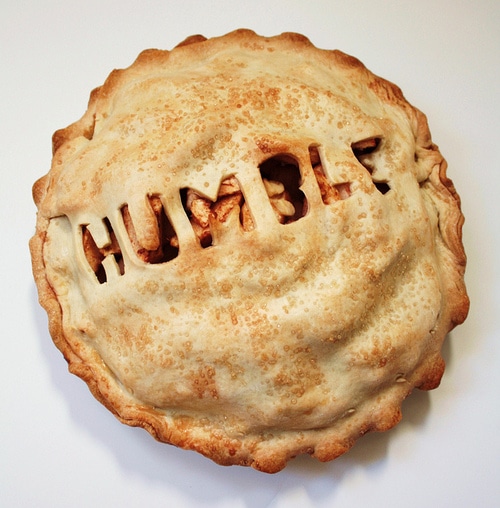Is being overly humble bad? Discover how being too humble in business can hurt you
I recently listened to The Power of Vulnerability by Brené Brown, a 6-hour recording of a workshop she did on the subjects of shame, vulnerability and empathy.
Now I know what you’re thinking: why is a business coach talking about shame, vulnerability, and empathy, and how does it relate to business success?
I’m so glad you asked!
Those three emotions have a great deal to do with your success, whether you want to admit it/believe it or not.
Let me explain why it’s a mistake to be too humble:
Over the last six years of coaching, I’ve discovered a common thread among my clients.
Not 100% of the time, more likely 90% or so of the time, I am working with clients who have a deserve-ability issue.
They are suffering from a sense of lack.
This is a common problem in our society.
Unfortunately, I’ve observed (and Brenner research supports) that only about 25% of the population is comfortable in their own skin and owns their greatness.
Now that doesn’t necessarily mean that the remaining 75% are all suffering from deserve-ability issues.
On the contrary, I’ve written in the past about the population of people who are self-absorbed, arrogant, and convinced they are superior.
My assertion is that the remaining 75% fall into one of two categories, the extreme opposite ends of the spectrum.
Either you categorize yourself as ‘not enough’ and don’t own your greatness, or you are at the other extreme or opposite end of the spectrum, which is the pompous, arrogant ass.

What a travesty, but not a surprise.
My observation in this is simply another byproduct of programming. Few among us can look back into our childhood and say,
“I was raised with love, compassion, and empathy. I was affirmed regularly that I am enough. There was never a moment in my childhood when I questioned my self-worth.”
How to be humble without being a candy-ass:
Don’t get me wrong; there are a few lucky souls out there who are balanced, emotionally healthy adults functioning at their peak on a reasonably regular basis as a result of their parenting.
But that’s a small percentage of the 25%.
Most of the folks who are in that élite group had to claw their way to that state through years of hard emotional work.
They had to consciously choose to own their story, shed their programming and pro-actively engage in writing the rest of their life story on their own terms.
As much as we try to compartmentalize our lives and keep personal and business separate, it is impossible because who we are shows up in how we work.
I too have suffered from the “I’m not good enough” syndrome.
And it has been through years of hard work with multiple coaches and various other practitioners that I’ve been able to claw my way to a healthier identity and self-worth.
It is a daily practice, a choice, and a state of belief that I consistently invest time and effort into.
And as a result, I have become more comfortable stepping into and owning my greatness.
I stopped apologizing for who I am, started asking for what I want, and more often am the shining example to the world what an emotionally healthy, high performing professional looks and sounds like.
So it was with great dismay that I’ve interacted with an individual who on two separate occasions commented to me that I lack humility.
[Note: this person is in the business of helping people feel good about themselves as an image consultant. FAIL?]
She was the liaison for a presentation I was scheduled for and had requested certain materials in advance.
I provided them on time, in order, accurately and completely.
Her response was a mix of surprise and gratitude that I followed through and provided her with the requested materials.
I responded that of course, I’m going to follow through. As a coach, I have to walk the talk! This was when she said,
“Well you’re not very humble, are you?”
WTF!?
Apparently following through, being accountable, being accurate and providing complete information is an unrealistic expectation.
The problem here is not that she has low expectations.
The problem is that she doesn’t think I should take credit for exceeding her expectations.
From her perspective, maybe I should have sheepishly grinned, looked down and muttered a half-hearted, “thanks.”
But instead, I owned my greatness. I took responsibility for my actions.
My CORRECT actions, regardless of how small. I chose to write a line in my story of how I AM good enough.
And for what I suspect is her lack of feeling good enough, she decided to try to knock me down to her level.
And she’s done that twice.
It’s caused me to become more aware of how people take a compliment [or not], and look back over the last six years of coaching to see that our society is suffering from an epidemic of over-humility.
I would illustrate one’s sense of self-worth on a continuum [no, I am clearly not an artist, which is why I write, I don’t illustrate!]
As you can see from this illustration, you have the opposite ends of the spectrum I described before.
At one end of the spectrum is an utter lack of confidence and self-worth. The “I’m not good enough” story you may be telling yourself.
At the opposite end of the spectrum of course is the self-absorbed, egotistical pompous ass I described before [I highly doubt you’re one of these people].
These folks may also get classified as narcissists, psycho- or sociopaths in our society.
Somewhere just left of the middle is humility, and somewhere just right of the centre is what I call self-assured.
It’s where I believe the magic happens.
WHY?
Because it’s enough confidence to own your greatness without being an ass, and it’s enough humility not to let your head get too big.
But it’s not smack dab in the middle of the spectrum because owning your greatness requires you to, well, own your greatness! That means you need to have a Goldilocks ego.
Just the right amount to keep you above the average.
When you have a Goldilocks ego, you aren’t average.
You’re not performing in the middle. You’re performing above the average, and most importantly, you know it, and you own it.
Owning your greatness means you aren’t afraid to stand out from the crowd, speak your mind, and own your individuality.
It also means you don’t feel the need to apologize for being yourself any more. You don’t give your power away, either.
You don’t lose your identity to relationships, your profession, or any other situation.
You rise above the drama of life and maintain your sense of self.
Resolve to shed some of your humility and step into and own your greatness – what’s the worst that could happen?
You may find some of your friends and colleagues won’t like the new you.
That’s because they are stuck in their own story of not owning their greatness. Let them stay there if they want.
You may also find some of your prospects, clients, vendors may not like the new you either.
Guess why? Refer to the previous paragraph.
And you may find that your loved ones won’t like the new you either. This change is a much more difficult situation, but I challenge you to rise above the drama.
Now let’s flip it around; what’s the best that could happen?
OMG, the list is endless!
You will become magnetic, energetically attractive, and downright irresistible to others.
You will begin to attract the friends & colleagues who admire your new confidence.
Prospects, clients, & vendors who fit your ideal profile will get drawn to you for reasons they may not necessarily understand.
Like attracts like, and you will become irresistible to people like you. Your business, life, and relationships will improve, become more fruitful and fulfilling.
In short, you will begin to live a better life. You will look good, feel good, and do more good.
The choice is yours. The time is now. You ARE enough. Go on, step into your greatness!
If you enjoyed this post on why being too humble in business can hurt you, retweet and comment, please.






